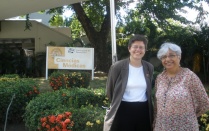UB expert on police mental health receives shoutout from U.S. attorney general
Release Date: January 31, 2024
BUFFALO, N.Y. – When U.S. Attorney General Merrick B. Garland delivered remarks at the Jan. 25 launch of a foundation in Washington, D.C., dedicated to improving the health and wellness of law enforcement officers, he quoted a University at Buffalo expert on police mental health.
That expert was John Violanti, PhD, a research professor in the Department of Epidemiology and Environmental Health in UB’s School of Public Health and Health Professions. Violanti serves in a leadership capacity for the Howard C. Liebengood Foundation, created by Howard’s widow, Serena Liebengood.
Violanti
Howard “Howie” Liebengood was a member of the U.S. Capitol Police and was on duty during the Jan. 6, 2021, riot on the Capitol. After enduring that traumatic event, Liebengood worked around the clock for days with minimal sleep between shifts. He died by suicide three days after the riot.
Serena Liebengood started the foundation to increase awareness of the psychological impact of policing and to improve workplace health and access to culturally competent health services for members of law enforcement.
“As Howard C. Liebengood Foundation board member John Violanti has said, ‘We need to immediately address issues which prevent care and health for those who protect and serve,’” Garland said in his remarks during the foundation’s launch event.
“Every single day, law enforcement officers are asked to risk their lives as they respond to some of the most difficult moments that our communities will face,” Garland added. “In doing so, they endure stress and trauma at a level the rest of us cannot even begin to comprehend. They should not have to face that alone.”
“As the wife of Capitol Police officer Howie Liebengood has stated, ‘Change begins with aspiration,’” Violanti says. “The Liebengood foundation aspires to lessen the difficult mental burden that law enforcement personnel endure. It is important to bring about change in law enforcement regarding mental wellness. This involves cultural change in law enforcement and acceptance of the reality of what this work does to mental stability and wellness. The foundation plans to employ a systems approach to mental health involving symposiums on mental health and suicide, developing stages of providing help, developing treatment protocols, and easing the pathway to treatment.”
Violanti is an internationally recognized expert on law enforcement mental and physical health. A former member of the New York State Police, Violanti has devoted his career as a researcher to examining issues that impact police mental health since retiring from the state police. He has conducted numerous studies through partnerships with the Buffalo Police Department, among other law enforcement agencies around the country.
Last year, Violanti served on a planning committee of experts convened by the National Academies of Sciences, Engineering, and Medicine that was tasked with examining ways to improve the measurement of death by suicide among members of law enforcement.
Violanti’s research in 2021 found that police officers are 54% more likely to die by suicide than the general population of American workers.
Violanti is currently working on a study that aims to clarify the patterns of death among first responders who worked at the World Trade Center site during and in the aftermath of the Sept. 11, 2001, terrorist attacks.
Police officers and other rescue and recovery workers there were exposed to numerous toxic and carcinogenic particles, including heavy metals, asbestos and benzene, Violanti explains. Studies reported that these exposures led to cardiovascular, respiratory and gastric diseases, in addition to depression, post-traumatic stress disorder, smoking and alcohol use, placing World Trade Center first responders at increased risk of death, especially from cancer.
“The WTC 9/11 study will help to verify patterns of cancer deaths among police officers who were involved in the 9/11 rescue and recovery by comparing them with officers not so involved,” Violanti says. “Additionally, the study will investigate the timing of treatment in the WTC exposed police to determine if early treatment helps to decrease the risk of mortality.”
Violanti is working with investigators from Stony Brook University. The study is being funded by the Albert Einstein College of Medicine and the National Institute for Occupational Safety and Health (NIOSH).
Media Contact Information
David J. Hill
Director of Media Relations
Public Health, Architecture, Urban and Regional Planning, Sustainability
Tel: 716-645-4651
davidhil@buffalo.edu
We want to hear about what you are doing in the field of global health. UB faculty, staff, and students, please send us articles highlighting your work!











